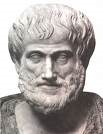
Aristotle departed from the Idealism of his master, Plato, by locating the forms of truth in things as they exist in the world. Thus, Raphael painted him with finger pointing down to the concrete particulars. Aristotle developed the rules of formal logic. He then used an inductive approach to analyze nearly every field of knowledge. Too often the church has used Aristotle’s evidential approach to defend the faith
Who was Aristotle? (384-322 B.C.) Aristotle studied under Plato for about 20 years, but rejected his master’s philosophic Realism, He replaced it with his own Conceptualist view. His father was a doctor in the court of the King of Macedonia in northeastern Greece. Aristotle taught in a gymnasium called the “Lyceum.” He used a “peripatetic” (teach while walking) method and system of thought.
Historical context. Aristotle’s theories were conceived in the context of civil war among the Greek city-states. Macedonia extended its power to impose order during his lifetime. Aristotle tutored the Macedonian prince, Alexander, known to history as Alexander the Great.
Summary of Aristotle’s teaching. Recall that epistemology is that branch of philosophy dealing with how we know what we know. Aristotle taught that truth has meaning only in the context of material objects and facts. Truth is derived from an analysis of these facts as they are found in nature. This is called Conceptualism. Using this inductive process, Aristotle became the greatest Greek biologist as well as philosopher. He also laid down the rules of formal logic. Induction is reasoning from facts to a conclusion. Deduction, by contrast, starts with a broad law and makes conclusions about specific cases.
In this system of syllogistic logic, comparing two premises points to a conclusion by deduction.
Aristotle followed Plato in teaching that a spark of the divine resides in man. Divinity may be nurtured in a life of virtue and noble character. The city-state has a duty to make sure its subjects are trained for a life of virtue. Man is a “political animal” that exists for the state. He only realizes himself in the context of the state. Ironically, because of the focus on particulars, men are also seen as autonomous (self-governing). Thus, they should strive for self-sufficiency. This odd tension may explain why Greece never had a strong central government beyond the city-state. The Greek city-states were autonomous and hostile.
Implications for subsequent history. The most striking outcome of Aristotle’s thinking was the military campaign of his disciple, Alexander. He conquered the then-known world. Aristotle’s thinking went into exile for over 1,000 years in the West. It was revived by the scholastic, Thomas Aquinas, in his Summa Theologica. Aristotle’s focus on earthly things was fertile ground for growth of the modern scientific method. Modern science holds that knowledge comes from inductive study of facts. It gave rise to the cult of “Scientism.” This fostered an undue respect for science and a secular outlook on life. Nothing is real except what can be detected by the senses. Spiritual truth from normative sources such as the Bible is suspect. Thus, it has been noted that while Plato “built” the cathedrals of Europe, Aristotle “built” the manor houses.
Aristotle’s approach to science was not widely adopted. But his system of logic and natural law has held great appeal for later thinkers. During the Medieval period this was called the scholastic movement. To the scholastics Aristotle was “the philosopher.” Aquinas tried to combine Aristotle’s logic with Christian theology. While intentions were good in most cases, the result has been very bad for the church. When we try to “prove” Scripture by some outside ground for belief it backfires. We end up raising that proof above the Word of God. Attempts to arrive at Bible truth via natural law or natural theology have pushed the Bible into the background. Or they have confined it to a “religious ghetto.” Natural theology is man’s attempt to derive doctrine from a study of nature. This is done apart from God’s Word and may be an attempt to prove or verify the Bible. Natural revelation, by contrast, is the voice of God speaking to man in creation (Psalm 19)
Biblical analysis. Churchmen who seek to defend Scripture by logic or outside proof have fallen for Satan’s offer to Eve (Genesis 3:1): “hath God said.” As the Word of God, Scripture is self-validating (II Tim 3:16). It must stand in judgment on all other claims to truth. Using evidences or logic to “prove” the Bible is an unlawful test. “Thou shalt not test the Lord thy God” (Mt. 4:7). This includes attempts to prove the Bible true as well as attempts to prove the Bible false. We dare not place the Word of God in the dock. Nor may mere mortals presume to judge the Word spoken by their Creator.
Corrective or prescriptive actions. All attempts to discover truth via natural law are futile. Likewise futile is any attempt to meet the natural man on common mental ground apart from the Bible. It is the Word of God which is “quick and powerful…able to discern the thoughts and intents of the heart” (Heb. 4:12), not philosophical guess work in any of its forms. Fathers must educate their children, not the state. According to Ephesians 6:4: “And ye fathers…bring them up in the nurture and admonition of the Lord.”